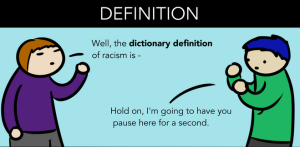
Two people stand close to one another in a city. One points to something in the distance; the other looks in that direction, holding up a map and smiling.
Yesterday, as I was walking home from a fantastic brunch with one of my favorite people, I passed a local pizza shop that I’ve ordered from many times. They have great pizza, fries, and milkshakes — and that trifecta is often hard to come by.
It was a beautiful day out, one of the first beautiful days of the year here in Philadelphia, and there was a group of men eating outside. Truth be told, I didn’t notice them — not yet anyway. I was on my phone, and I was on a mission to get home and take a nap.
Then, from behind me, I heard, “Now that’s what I’m talking about” — and the group of men laugh.
I decided to ignore it. I wasn’t even 100% sure that it was about me; maybe they, too, were pumped about the pizza-fries-milkshake combo. And then I heard the guy pipe up again, loud enough for me to hear, “I mean, am I right or am I wrong?”
The guys in the group gave various grunts of approval, and as I waited to cross the street, I rolled my eyes in private. I was aggravated at the objectification inherent in being a direct topic of conversation without ever being addressed as standing right there — like I’m a couch that you’re considering buying, and not a human being. But I wasn’t in the mood to speak up.
Until the guy followed me a couple of steps and threw at me, “Nice tattoo.”
I turned to give him a look of annoyance. And then he asked, “Would you like to give me your number?”
To which, I responded, “No. I don’t. And you know what else I don’t want? To hear you talking about me to a group of men like I’m a piece of meat.”
The light turned green. I walked away, frustrated.
Ten minutes or so later, as I was nearing my own apartment, another man stopped what he was doing to toss attention my way. This guy said, “You look very nice today” — and left it at that.
To which, I responded, “Thank you.”
And my politeness shouldn’t come as a surprise — although I, of course, don’t owe it to any stranger to respond to them when they talk to me. Because even a comment as seemingly innocuous as that one is unnecessary and still potentially objectifying.
But I have never in my life been angry with a man for approaching me at random, so long as he treated me like a human being when he did so.
Yet, this rarely happens.
Worse, men never believe it! No matter how many times women complain about being street harassed, they think we’re whining about honest attempts at kind communication – but we’re not.
Because no, guys, most men don’t approach us on the street with respect. Y’all usually approach us with some serious (and gross) sexual entitlement.
But when we talk about this, the response from most men is usually along the lines of, “So, what? Are we not allowed to talk to women that we think are attractive? Like at all?”
And the answer to that is no. That’s not necessarily what we’re saying.
But y’all clearly need a guide on how to start those conversations. Because what you’re teaching one another while posturing masculinity is degrading, hurtful, and oppressive (and also ineffective, if you’re actually trying to gauge our interest level).
So next time, try this instead:
1. Understand That She Might Not Appreciate Being Approached At All
When I’m on my way to the post office — regardless of if I’m in sweatpants or a mini skirt — I’m honestly just on my way to the post office. And considering how long the wait can be, I want to get there fast.
So it’s not necessarily the best time to confess your undying love for me — or your passing interest in possibly seeing me naked. Even if you’re going to approach me in a sensible, respectful manner (more on that to follow), I might not be in the mood — especially if I’ve already been street harassed that day.
It can be exhausting to be a woman out in public. I once recorded incidences of street harassment at ten times in forty minutes. Jesus Christ.
Sometimes I just want to be left alone!
The same goes for if I have my headphones in while I’m sitting on the subway or if I’m in the park with my nose in a book. If I look busy, I am – and I’m entitled to my personal space.
But that doesn’t mean that you can’t pay me a compliment or ask me how I’m doing ever. It just means that there are conditions under which I’m already suggesting with my body language that I’m not interested in a conversation.
2. Consider Your Surroundings
Ask any woman that you know how she feels when she’s alone in an elevator with a man who is eyeing her — or if she’s walking down the street and has to pass a group of men. I guarantee you that her answer is going to be along the lines of “uncomfortable.”
Here’s why: Regardless of how upstanding of a gentleman you may be, virtually all of us have horror stories of times when men have been violent toward us — sexually, physically, or verbally — in these kinds of situations.
Being stuck in an elevator with a man who’s licking his lips at me makes the hairs on the back of my neck stand up, the four-letter “R” word that every woman lives in constant fear of running terrifying scenarios through my brain.
So even if you’re a “nice guy,” I don’t know that when you just say hi. I have no idea where this conversation might go. And I have no way to escape. To you, it’s just a normal greeting; to me, it could turn into a nightmare.
Groups of men are similarly scary to women, and it’s no wonder why. And because of how the performance of masculinity – and therefore, the reaction to being rejected — often plays out, women passing by groups of men often want to do so as quickly as possible (and, if they’re like me, have a constant looped prayer of “Don’t talk to me, don’t talk to me” playing in their head).
Are you on the subway, especially a near empty car, with a woman who you want to approach? Is it nighttime, and is she alone? These aren’t good times to strike up a conversation with someone – ever.
Want to be friendly? Okay. Throw her a “I hope you’re having a great night” and leave it at that.
But if you’re in an environment where you think it might be okay to talk to a stranger, you should make it clear that your intentions aren’t to frighten, bother, or disrespect her.
You would be amazed at how helpful it can be just to start your sentence with “I don’t want to bother you, but…” or “I hope this isn’t offensive, but…”
I might still be bothered. I might still find it offensive. I might really not want to be approached at all, regardless of your intentions or politeness.
But at least it acknowledges my humanity from the get-go – and that’s a rarity.
3. Open with an Honest Conversation Starter
I’m not sure where men learned that “Hey girl,” “Can I get your number,” and “You look good” are great openers to conversation, but let me tell you something: They’re not.
These oh-so-common “openers” aren’t openers at all — they’re boring, overused lines that men usually (hopefully?) don’t expect a genuine response from. It’s like dudes who send messages on dating sites that are just like “hey” or “you’re cute.”
Sir, please.
If you want me to believe that you’re interested in me because I, specifically, have something worth your while (whether that’s my cute face or my on-point “On a typical Friday night, I’m…”), don’t throw generic shit my way. I don’t have time for it.
All it shows me is that you think of women as a monolith — like swiping right on all of us in hopes of getting at least one response. And treating us like we’re faceless holes to possibly fuck isn’t really a good way to express your interest.
But when I noted on Twitter that “Hey girl, you look good — can I get your number?” or any other, similar iteration was useless, the response from the manosphere was (literally): “So what are we supposed to say? ‘You’re a fucking ugly whore?’”
I mean, is there no in-between?
Honestly, a simple “How are you?” could work if I’m attracted to you, too. Or try commenting on the statement tee that I’m wearing. Or even comment on the weather to get my attention. The point is: No, I don’t want to give you my number when I’ve literally had no contact with you aside from your asking or it.
And if you want to start with a compliment, well…
4. Use Compliments That Are Relatively Vague — And Never Sexual
If you want to start a conversation with a woman you don’t already know, try complimenting her on something that isn’t super specific. “The light in your eyes shines like the rays of the sun” is kind of weird. So is “You have a really cute mole on your chin.” Even if these two things are obviously true for me.
But something as simple as “I like your glasses” or “Your hair is awesome?” I’m okay with that.
I will genuinely and honestly thank you. That makes me feel good, whether or not I’m interested in pursuing more with you. This isn’t true for all women, of course, but any quick compliment that doesn’t explicitly ask more from me is okay in my book.
I, myself, frequently tell women that I find attractive these things. And while the girls-complimenting-girls dynamic is different (and awesome, PS), the authentic intention behind it is similar – so long as that’s your intention: to pay someone a compliment and feel okay with it being left there.
But lay off the sexual “compliments,” please. I can promise you that most women don’t feel “complimented” when you mumble after us that we have a nice ass — or if you shout “Nice tits!” at us while you ride by on your bike.
I almost pushed a dude off of his bicycle for that exact comment — but then I didn’t feel like explaining my assault to the police.
Similarly, I’ve gotten, on multiple occasions, “I’d like to tear that pussy up,” “I’d love to be between those thighs,” and the vague-but-just-as-creepy “Mm, the things I would do to you.”
Unless you’re my already-established partner and we’ve had a discussion where I’ve expressed comfort with your saying those things to me, they’re not examples of complimenting. They’re violating.
5. Pay Close Attention to Her Body Language
I’ve often joked (oh, the misandry!) that all men should be put through a compulsory class on how to pick up on social cues.
Generally speaking (disabilities notwithstanding), we learn body language at the same time that we learn verbal language — and we tend to read body language more than verbal language. And there is tons of research on social learning to suggest that—well—we should be able to discern a person’s general emotional state just by paying a modicum of attention to how they’re acting.
Somewhere along the line, though, boys and men are taught to ignore when women are uncomfortable.
Let me say this plainly: If I look uncomfortable when you’re talking to me, I am. I’m not shy. I’m not coy. I’m not playing hard-to-get. I want you to go the fuck away.
“No means no” sexual violence prevention education has failed us in some ways. Because while it’s true, of course, that if someone says “no” to assume that they really, truly, honestly mean it, there are plenty of ways to suggest “no” without ever uttering the word.
And while a “yes means yes” approach isn’t perfect either, this general lesson is helpful: If the person you’re talking to doesn’t seem enthusiastic about you’re talking to them, it’s probably best to stop.
If the eye contact that I’m making with you is incredibly brief and then I dart my eyes away, I’m not interested. If my smile is forced and not genuine, I’m not interested. If my words are short and curt, I’m not interested. If I’m trying to get away from you, I’m not interested. If I’m making up excuses, I’m not interested.
If I’m not authentically acting interested, I’m just not interested.
6. Let Her Initiate Further Correspondence
Please don’t ask women for their phone numbers.
You don’t realize, perhaps, that you’re putting us in incredibly awkward situations when you do, but you are. This is the whole reason why rejection numbers exist — because we’ve been socialized not to say no to you, or to be deathly afraid of saying no to you, so we feel like we have to give you something.
If I want to give you my number, I will. I have, in fact, on multiple occasions, given my phone number to people with whom I’ve struck up conversation and found attractive.
It’s a simple way to say, “I’m into you. And if you’d like to see where this could go, please contact me again.” And it gives the other person all of the agency.
If you think that a conversation is going well, instead of asking for her number, give her yours.
That way, she can decide, on her own, whether or not she wants to engage in future correspondence, and it doesn’t put her on the spot to give you her contact information when she doesn’t want to.
7. Be On Your Way
Is there anything more annoying than a dude who won’t go away, even though the conversation has died down, and you’ve literally turned your body away from him? It’s like a fucking mosquito buzzing in your ear, except they’re just hemming and hawing, trying to figure out what to say next.
Learn to take your exit cue.
If the conversation is over, it’s over. Tell her to have a nice day, and then leave. Don’t tell her “I hope to hear from you.” Don’t continue mumbling to yourself within her earshot about how gorgeous she is. Don’t keep staring and smiling.
Go away.
If you’ve approached her respectfully, you will potentially have made her day (or at least didn’t ruin it), even if she’s uninterested. But then you have to actually let her get on with her day. Because nothing says “I respect you as an autonomous human being” than letting us live our lives free of harassment.
***
Some women are okay with unsolicited compliments and attention — because some of all people like unsolicited compliments and attention. It can be nice to have someone tell you that you’re pretty or that your shoelaces are neat or that your makeup is on-point.
But the way that you come at us matters.
Because trust me: If women felt comfortable and respected by the way that men generally approach us, we wouldn’t complain about it. So maybe it’s time to try something else, yeah?
And hopefully this gives you a place to start.
[do_widget id=’text-101′]
Melissa A. Fabello, Co-Managing Editor of Everyday Feminism, is a body acceptance activist and sexuality scholar living in Philadelphia. She enjoys rainy days, tattoos, yin yoga, and Jurassic Park. She holds a B.S. in English Education from Boston University and an M.Ed. in Human Sexuality from Widener University. She is currently working on her PhD. She can be reached on Twitter @fyeahmfabello.
Search our 3000+ articles!
Read our articles about:
Our online racial justice training
Used by hundreds of universities, non-profits, and businesses.
Click to learn more




















